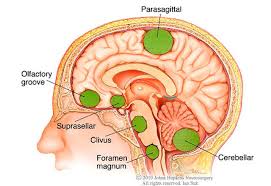Contents 
– Overview
– Symptoms
– Diagnosis
– Treatment
– Recovery
A benign brain tumour is a slow-growing mass of non-cancerous cells in the brain. These tumours typically remain localized and do not metastasize. If surgically removed completely, they are unlikely to return. However, if removal isn’t possible, they may need to be monitored or treated with radiotherapy to manage growth.
Types and Grades of Non-Cancerous Brain Tumours
Various types of non-cancerous brain tumours exist, classified based on the affected brain cells:
- Gliomas: Tumours of glial tissue that support nerve cells.
- Meningiomas: Tumours of the membranes surrounding the brain.
- Acoustic Neuromas: Tumours on the acoustic nerve (vestibular schwannomas).
- Craniopharyngiomas: Tumours located at the brain’s base, often seen in younger patients.
- Haemangioblastomas: Tumours of the brain’s blood vessels.
- Pituitary Adenomas: Tumours of the pituitary gland, which is located at the brain’s base.
The Cancer Research UK website provides further details about various brain tumour types.
Brain tumours are graded from 1 to 4 based on their growth rate and recurrence potential. Non-cancerous tumours are typically grade 1 or 2, as they are generally slow-growing and have a low risk of spreading. While they are not cancerous and can often be treated effectively, they can still pose serious health risks.
Symptoms of Non-Cancerous Brain Tumours
Symptoms vary based on the tumour’s size and location. Some slow-growing tumours may initially show no symptoms. Common symptoms include:
- Persistent headaches
- Seizures
- Nausea, vomiting, and drowsiness
- Changes in personality or behavior
- Weakness, vision issues, or speech difficulties
When to See a GP
Consult a GP if you experience any symptoms of a brain tumour. While a tumour is unlikely, it’s important for a doctor to evaluate your symptoms. The GP may perform a neurological exam and, if needed, refer you to a neurologist for further assessment.
Causes of Non-Cancerous Brain Tumours
The exact cause of most non-cancerous brain tumours is unknown, but certain factors may increase risk, including:
- Age over 50
- Family history of brain tumours
- Genetic conditions like neurofibromatosis, tuberous sclerosis, or Li-Fraumeni syndrome
- Prior radiotherapy
Treating Non-Cancerous Brain Tumours
Treatment approaches depend on the tumour’s type and location. Surgery is the primary method for removing most non-cancerous tumours, which usually do not recur after complete removal. However, some may grow back or become cancerous. If complete removal isn’t feasible, additional treatments like radiotherapy or chemotherapy may be necessary.
Recovery from Treatment
Post-treatment, some individuals may experience ongoing issues such as seizures or difficulties with speech and mobility, requiring supportive care. Many can eventually return to their normal activities, though recovery may take time. Talking to a counsellor can be beneficial for addressing emotional concerns related to diagnosis and treatment.
For support, organizations like the Brain Tumour Charity and Brain Tumour Research provide resources and helplines in the UK.




























